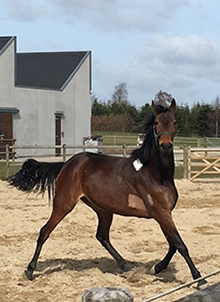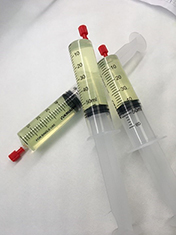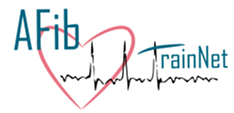Atrial selective IK,ACh Inhibition in an equine model of persistent AF
Principal Investigators: Rikke Buhl and Thomas Jespersen
Study Director: Merle Friederike Fenner
Master students: Sarah Dalgas Nissen, Maja Adler Hess Jensen, Christine Scott Lunddahl
Background:
Inhibition of the G-protein gated acetylcholine-activated inward rectifier potassium (K+) current, IK,ACh, has been proposed to be an effective atrial selective treatment strategy for atrial fibrillation. Therefore, the anti-arrhythmic and electrophysiological properties of a novel potent and highly specific IK,ACh inhibitor, XAF-1407, were characterised for the first time in vitro and investigated in an in vivo equine, atrial-tachypacing-induced model of persistent AF in the following.
 Experimental approach:
Experimental approach:
Subsequent to profound electrophysiological and pharmacological in vitro selectivity profiling of XAF-1407, the horse, as a large animal model for preclinical investigations in AF of longer duration, was employed. In this model 11 horses were equipped with implantable cardioverter defibrillators (ICD) enabling atrial-tachypacing into self-sustained AF. The electrophysiological effects of XAF-1407 (3 mg kg-1) were investigated at different time points over a period of one month. Cardioversion success, drug induced changes of atrial tissue refractoriness and ventricular electrophysiology were assessed at baseline (day0) and at day 3, 5, 11, 17 and 29 after AF induction.
Results:
XAF-1407 inhibited Kir3.1/3.4 hetero- and Kir3.4 homotetramers, underlying the IK,ACh current, with the same potency and at high specificity. XAF-1407 treatment in horses prolonged atrial effective refractory period (aERP), decreased atrial fibrillatory rate (AFR) and successfully cardioverted AF, although with a decreasing efficacy over time. XAF-1407 shortened AV-nodal refractoriness, and provided a minor QT prolongation but did not affect QRS duration. Ventricular pro-arrhythmicity was not observed.
 Conclusion and implication:
Conclusion and implication:
Treatment with XAF-1407 was found to efficiently cardiovert shorter duration AF of tachypacing induced AF in horses and did not induce noteworthy safety compromising side effects. The study thereby suggests that IK,ACh inhibition may constitute a potentially potent and safe treatment modality of paroxysmal AF in horses, indicating clinical value for other species including humans.
Funding:
This project has received funding from the European Union’s Horizon 2020 MSCA ITN under Grant Agreement No. 675351.


